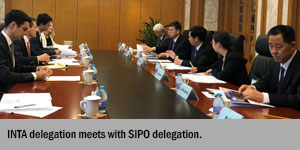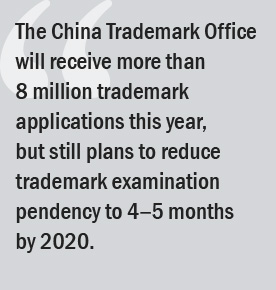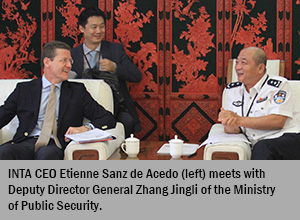INTA Delegation Discusses Key Issues, Collaboration with China IP Leaders
Published: August 1, 2018
From July 17 to 18, INTA organized a leadership delegation in Beijing, China, to discuss priority issues with trademark and intellectual property (IP)-related ministries, including the State Intellectual Property Office (SIPO), China Trademark Association (CTA), Beijing IP Court, the Ministry of Public Security (MPS), Economic Crimes Investigation Department (ECID), and the General Administration of Customs IP Department. INTA also conducted membership recruitment events and participated in a VIP lecture with leading professors and thought leaders.
Discussing Trademark Law Amendments, Anticounterfeiting
INTA’s leadership delegation, headed by INTA CEO Etienne Sanz de Acedo, met with SIPO Deputy Commissioner Liu Junchen on July 17. This marked the first meeting with INTA leadership and Chinese authorities since the major restructuring of China’s IP ministries in March, which saw trademark, geographical indications, and other regulatory issues moved to SIPO and combined under a new regulatory body, the State Administration of Market Regulation (SAMR).
 Deputy Commissioner Liu welcomed INTA’s delegation and thanked the Association for hosting officials from the China Trademark Office to INTA’s Annual Meeting in Seattle earlier this year and for signing a letter of intent last year. He noted that the office continued to receive more and more applications, and they estimate that the office will receive over 8 million trademark applications this year. At the same time, he noted that the office is setting goals to reduce trademark examination pendency to 4‒5 months by 2020. Under the current trademark law, applications are required to be examined within nine months. Deputy Commissioner Liu also noted that the China Trademark Law amendment process has commenced and welcomed INTA’s views.
Deputy Commissioner Liu welcomed INTA’s delegation and thanked the Association for hosting officials from the China Trademark Office to INTA’s Annual Meeting in Seattle earlier this year and for signing a letter of intent last year. He noted that the office continued to receive more and more applications, and they estimate that the office will receive over 8 million trademark applications this year. At the same time, he noted that the office is setting goals to reduce trademark examination pendency to 4‒5 months by 2020. Under the current trademark law, applications are required to be examined within nine months. Deputy Commissioner Liu also noted that the China Trademark Law amendment process has commenced and welcomed INTA’s views.
Mr. Sanz de Acedo noted the increasing numbers and that, at 8 million applications, China clearly received more than half of global trademark applications. INTA members are chiefly concerned about the increasing numbers of bad-faith trademark applications. Mr. Sanz de Acedo noted that INTA’s policy advocacy committees will submit views by the end of the public comment period on July 31. (Please see here for a copy of the submission.)
 Following this meeting, INTA’s delegation met with CTA Secretary General and President, Ma Fu. INTA and CTA reviewed their history of cooperation, which includes instances of shared education programming. Most recently, this included a CTA-organized panel session at the INTA Annual Meeting in Seattle, and will also include an INTA-organized session at this year’s CTA Festival in Tangshan, China, in August. Discussions also touched on potential areas of advocacy engagement and research. INTA and CTA successfully organized a workshop on bad-faith trademark registrations earlier this year in March. INTA and CTA look forward to continuing their cooperation for the mutual benefit of the international and Chinese trademark community.
Following this meeting, INTA’s delegation met with CTA Secretary General and President, Ma Fu. INTA and CTA reviewed their history of cooperation, which includes instances of shared education programming. Most recently, this included a CTA-organized panel session at the INTA Annual Meeting in Seattle, and will also include an INTA-organized session at this year’s CTA Festival in Tangshan, China, in August. Discussions also touched on potential areas of advocacy engagement and research. INTA and CTA successfully organized a workshop on bad-faith trademark registrations earlier this year in March. INTA and CTA look forward to continuing their cooperation for the mutual benefit of the international and Chinese trademark community.
INTA’s leadership delegation met with Deputy Chief Judge Song Yushui of the Beijing IP Court. Judge Song reviewed the progress of the Court since INTA last visited in 2015. The Court currently hears more than 20,000 cases per year, 80 percent of which are trademark related. The Court has implemented a number of fast-track programs to speed adjudication of these important matters. INTA welcomed further research initiatives with the Court to improve process and substantive matters. INTA also raised the possibility of amicus brief submissions in the future.
On July 18, INTA focused on meetings with enforcement authorities. The first meeting was conducted by Deputy Director General Zhang Jingli of China’s MPS, ECID. Mr. Zhang expressed appreciation for working with INTA at the Annual Meeting, having joined several anticounterfeiting-related sessions and committee meetings. He noted that INTA as a communications platform is incredibly important to highlight the innovation and efforts of Chinese enforcement authorities. INTA’s delegation noted the importance of online and offline actions to fight the sale of counterfeit goods online. INTA shared the recently released best practices paper, “Addressing the Sale of Counterfeits on the Internet.” Mr. Zhang noted that MPS is using more sophisticated techniques and data analysis to combat this problem. Finally, INTA raised concerns about formality on power of attorney affecting companies from certain countries which block entry to the court.
 INTA’s final meeting of the day was with Customs IP Department Vice General Director Huang Jianhua. As the world’s largest exporter of branded goods, China Customs has a tremendous responsibility and burden to monitor the trade in counterfeit goods. The number of seizures-17,000 in 2017-reflects this importance. INTA noted the need for more cross-border enforcement coordination, and welcomed customs to join next year’s Annual Meeting. INTA noted the valuable tools created by the Anticounterfeiting Committee, such as the online webinar product identification trainings offered through the Customs Connection program.
INTA’s final meeting of the day was with Customs IP Department Vice General Director Huang Jianhua. As the world’s largest exporter of branded goods, China Customs has a tremendous responsibility and burden to monitor the trade in counterfeit goods. The number of seizures-17,000 in 2017-reflects this importance. INTA noted the need for more cross-border enforcement coordination, and welcomed customs to join next year’s Annual Meeting. INTA noted the valuable tools created by the Anticounterfeiting Committee, such as the online webinar product identification trainings offered through the Customs Connection program.
Growing the Stakeholder Network in China
INTA conducted a membership recruitment dinner in the evening. Meeting with INTA membership champions from the China Global Advisory Council and volunteers, INTA invited non-member companies from around China to participate and learn about the service offerings and international network.
The Association supported a program with Justra Intellectual Property Research Center on the Future Outlook of Trademarks. Professors Liu Chuntian (Renmin University, China) and Professor Liu Kung-Chung (Singapore Management University, Singapore) shared views on the outlook for trademarks from an academic perspective. Mr. Liu noted that, with the surge in trademark applications in China, necessary policy changes should be implemented to bring the use and registration of trademarks in line with productive economic activity. Felix Fan (Alibaba, China) shared industry views on protecting trademarks online, and Huang Hui (WanHuiDa Peksung Law Firm, China) shared the views of practitioners highlighting interesting policy differences between China and the European Union-particularly in light of forthcoming China trademark law amendments.
INTA also had its first meeting with the IP Publishing House (IPPH)-the education and communications arm of SIPO. IPPH expressed interest in working with INTA to build capabilities on trademarks, now that SIPO is responsible for this sector. IPPH also invited INTA to participate in this year’s Patent Information Conference in August.
During the delegation week, INTA reached out to foreign government representatives in China and convened local representatives in charge of IP from Australia, the European Union, Germany, the United States, and the United Kingdom to share views on the policy outlook in China.
In addition to the delegation, on July 20 in Shanghai, INTA was invited to speak at a forum hosted by CTA and Chinese brand registry, DotTrademark, in Shanghai. INTA Chief Representative Officer, Asia-Pacific and China, Seth Hays, delivered opening remarks, and former INTA Board Member Peter Dernbach (Winkler Partners, Taipei) delivered a substantive presentation on INTA’s work in the Internet space with ICANN and online anticounterfeiting efforts. Mr. Dernbach emphasized INTA’s various activities in the area, including the work of both the Anticounterfeiting Committee and Internet Committee, and pointed to projects such as trainings of customs officials, best practices papers, and ICANN policy review. Mr. Dernbach also emphasized recent changes to ICANN’s WHOIS database.
Other organizations involved in the program included the Hong Kong International Arbitration Centre, Asian Domain Name Dispute Resolution Centre, Asian International Arbitration Center, Shanghai Pudong IP Association, China International Economic and Trade Arbitration Commission, and the Legal Executive Board. Company speakers included industry and service provider representatives, such as Tencent.
Although every effort has been made to verify the accuracy of items in the INTA Bulletin, readers are urged to check independently on matters of specific concern or interest. Law & Practice updates are published without comment from INTA except where it has taken an official position.
© 2018 International Trademark Association
This website uses cookies so that we can provide you with the best user experience possible. Cookie information is stored in your browser and performs functions such as recognising you when you return to our website and helping our team to understand which sections of the website you find most interesting and useful.
To find out more please see our Cookies Policy and Privacy Policy.
These cookies are used to identify a user’s browser as the visitor goes from page to page on the Site. These are session cookies, which means that the cookie is deleted when you leave the Site. It is an integral piece of the Site software and used to let the server know which users are on the Site at any given time and make certain parts of the Site easier to use.
|
|
If you disable this cookie, we will not be able to save your preferences. This means that every time you visit this website you will need to enable or disable cookies again.
These cookies are used to collect information about how visitors use our Site. The cookies collect information in anonymous form, including the numbers of visitors to the Site, where visitors have come to the Site from, the pages they visited and how they have interacted with tools on the Site like search and embedded media players. We use the information to compile statistical reports of our users’ browsing patterns so that we can improve the Site.
|
|
Please enable Functionality Cookies first so that we can save your preferences!
These cookies are used to deliver advertising relevant to the interests of visitors to our Site. They are persistent, which means they will remain on your device after you leave the Site.
- Facebook (Ad Pixel)
- Google (Ad Pixel)
- LinkedIn (Ad Pixel)
- Quattro Anonymous
Please enable Functionality Cookies first so that we can save your preferences!
